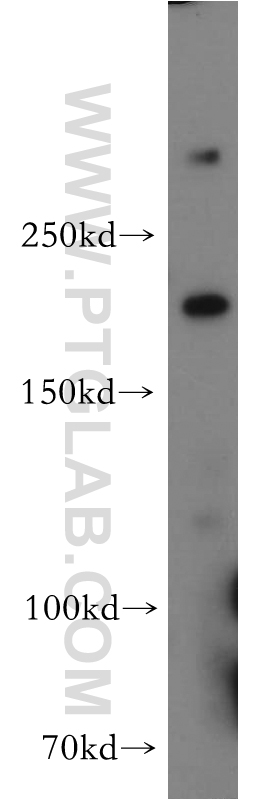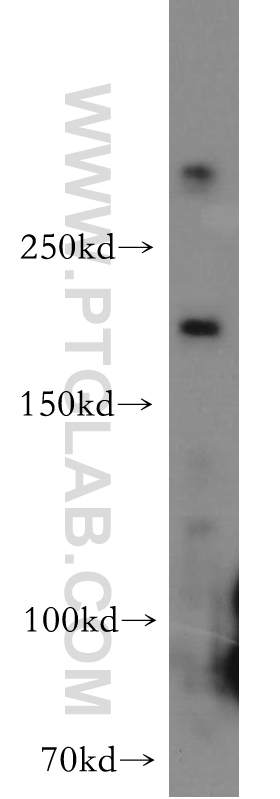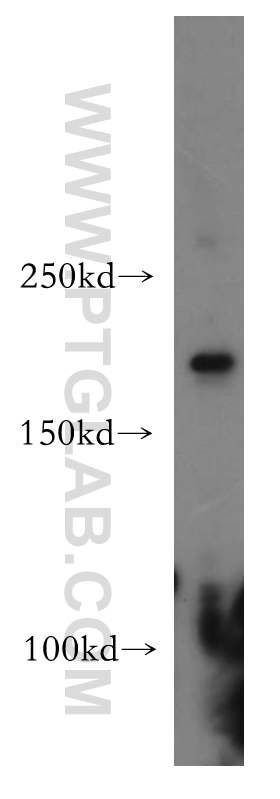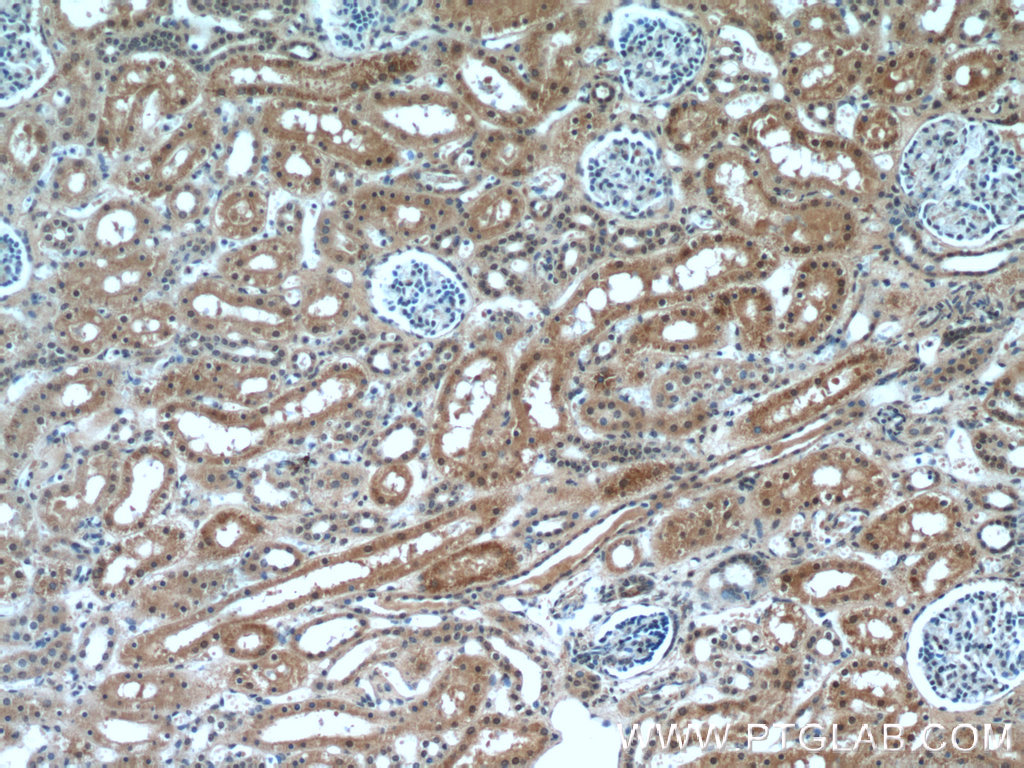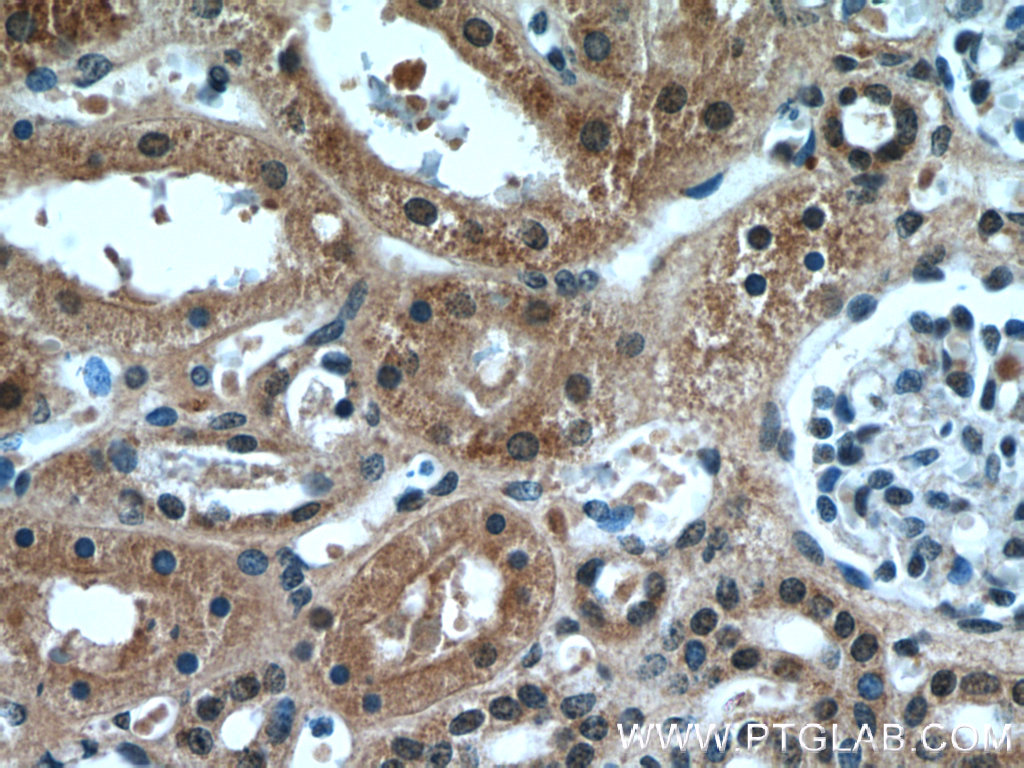验证数据展示
经过测试的应用
| Positive WB detected in | HEK-293 cells, A431 cells, Jurkat cells |
推荐稀释比
| 应用 | 推荐稀释比 |
|---|---|
| Western Blot (WB) | WB : 1:500-1:2000 |
| It is recommended that this reagent should be titrated in each testing system to obtain optimal results. | |
| Sample-dependent, Check data in validation data gallery. | |
发表文章中的应用
| IF | See 1 publications below |
产品信息
19358-1-AP targets HCFC1 in WB, IF, ELISA applications and shows reactivity with human, mouse, rat samples.
| 经测试应用 | WB, ELISA Application Description |
| 文献引用应用 | IF |
| 经测试反应性 | human, mouse, rat |
| 文献引用反应性 | human, rat |
| 免疫原 | HCFC1 fusion protein Ag6798 种属同源性预测 |
| 宿主/亚型 | Rabbit / IgG |
| 抗体类别 | Polyclonal |
| 产品类型 | Antibody |
| 全称 | host cell factor C1 (VP16-accessory protein) |
| 别名 | C1 factor, CFF, HCF, HCF 1, HCF1, HCFC1, HFC1, Host cell factor 1, VCAF, VP16 accessory protein |
| 计算分子量 | 209 kDa |
| 观测分子量 | 230 kDa, 300 kDa |
| GenBank蛋白编号 | BC063435 |
| 基因名称 | HCFC1 |
| Gene ID (NCBI) | 3054 |
| RRID | AB_10860105 |
| 偶联类型 | Unconjugated |
| 形式 | Liquid |
| 纯化方式 | Antigen affinity purification |
| UNIPROT ID | P51610 |
| 储存缓冲液 | PBS with 0.02% sodium azide and 50% glycerol , pH 7.3 |
| 储存条件 | Store at -20°C. Stable for one year after shipment. Aliquoting is unnecessary for -20oC storage. |
背景介绍
Host cell factor 1 (HCFC1), also known as HCF-1, is a transcriptional co-regulator with a proteolytic cleavage at the PRO repeats that could be cleaved by O-GlcNAc transferase (OGT) to produce a heterodimeric complex of HCFC1N and HCFC1C subunits (PMID: 23539139). HCFC1 was first identified in herpes simplex virus transcription while it lacks a DNA binding domain. HCFC1 is not a traditional transcription factor, it interacts with multiple protein including transcription factors to regulate many biological processes, such as cell proliferation, migration, cell death and mitochondrial biogenesis (PMID: 25281006). Mutation in HCFC1 was related to an X-linked recessive disease ---cblX with a complex clinical manifestation involved in error of metabolism, neurocognitive impairment and craniofacial abnormalities (PMID: 24011988; PMID: 25281006).
实验方案
| Product Specific Protocols | |
|---|---|
| WB protocol for HCFC1 antibody 19358-1-AP | Download protocol |
| IHC protocol for HCFC1 antibody 19358-1-AP | Download protocol |
| Standard Protocols | |
|---|---|
| Click here to view our Standard Protocols |
